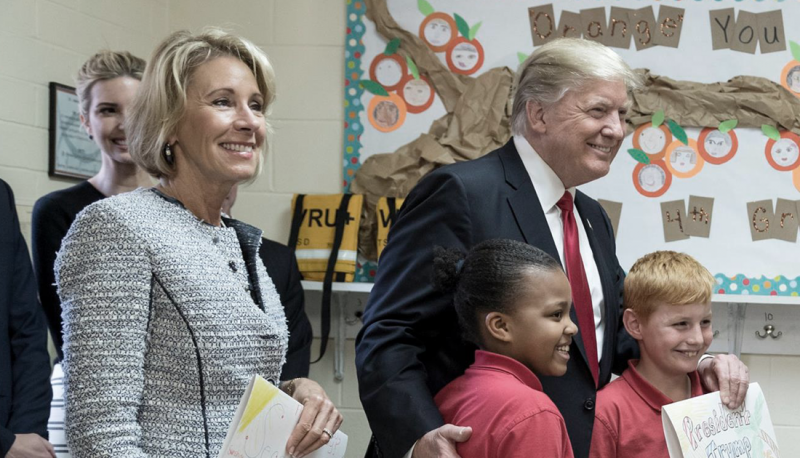As they attempt to score political points instead of filling Americans’ basic needs, congressional Republicans continue to pursue funding for the deeply flawed D.C. private school voucher program. Studies have consistently shown that these vouchers have not improved educational outcomes and suffer from program management and accountability failures. Yet, both the House and Senate want to fund these vouchers for yet another year. The Senate has even proposed increasing D.C. voucher funding. People For the American Way will continue to stand up for D.C. students and against voucher schemes that undermine public education. Accordingly, PFAW joins our National Coalition for Public Education (NCPE) allies who oppose the Senate’s current proposal. You can download our letter here.
Dear Senator:
The 38 undersigned members of the National Coalition for Public Education (NCPE) write to voice opposition to the funding of the District of Columbia private school voucher program in the FY2019 Financial Services and General Government Appropriations bill. We oppose this and all private school voucher programs because public funds should be spent on public schools, not private schools. The D.C. program, in particular, has proven ineffective and unaccountable to taxpayers. Congress should not allocate millions of taxpayer dollars to an unsuccessful and poorly managed program, and it certainly should not increase funding for the program beyond its previous funding level, as this bill seeks to do.
The Program Does Not Improve Educational Opportunities for Students
Multiple congressionally mandated Department of Education studies of the D.C. voucher program have demonstrated that the program does not improve the academic achievement of students in the program.1 In fact, the two most recent Department of Education studies of the program demonstrate that students using vouchers are performing worse academically than their peers not in the voucher program.2
The recent studies have also found that the voucher program has no effect on student or parental satisfaction, or on parental involvement.3 And, previous studies have indicated that many of the students in the voucher program are less likely to have access to key services such as ESL programs, learning supports, special education supports and services, and counselors than students who are not part of the program.4 Moreover, a study from the Urban Institute found that receiving a voucher does not increase D.C. students’ college enrollment rates.5
Having failed to improve the academic achievement and school experience of the students in the voucher program, it clearly does not warrant continued funding.
The Program Lacks Sufficient Oversight and Accountability
The program has also repeatedly failed to meet basic accountability standards. GAO reports from both 2007 and 2013 document that the DC voucher program has repeatedly failed to meet basic and even statutorily required accountability measures.6 The 2013 report concluded that the then-administrator of the program, the DC Children and Youth Investment Trust Corporation (Trust), had continually failed to ensure the program operated with basic accountability measures and quality controls7 and failed to maintain adequate records on its own financial accounting.8 The interim executive director of the Trust even admitted that “quality oversight of the program as sort of a dead zone, a blind spot.”9 These problems persist even with a new program administrator. In 2015, the new administrator of the program, Serving our Children, was unable to provide basic program information to a Congressional oversight committee, such as what percentage of each voucher school’s population comprised students using a voucher.10
Many Participating Schools Are of Poor Quality
A special investigation conducted by The Washington Post found that many of the private schools in the program are not quality schools.11 It described one school that consisted entirely of voucher students as existing in just two classrooms in “a soot-stained storefront” where students used a gymnasium two miles down the road.12 Another voucher school was operated out of a private converted home with facilities so unkempt that students had to use restrooms in an unaffiliated daycare center downstairs.13 And yet another school, where 93% of the students had vouchers, used a “learning model known as “Suggestopedia,” an obscure Bulgarian philosophy of learning that stresses learning through music, stretching and meditation.”14
Poor quality schools have likely contributed to the D.C. voucher program’s declining enrollment rates. As of the 2016-17 school year, the program enrolled 30% fewer students than it did four years before, despite an overall increase in applicants.15 And program statistics reveal that for that school year, one-third of returning voucher students did not use their voucher and more than half of the new students who received a voucher did not use it.16 Declining enrollment rates are further evidence that the program’s continued funding is unwarranted.
The Voucher Program Endangers Civil Rights and Undermines Constitutional Protections
Despite receiving public funds, the private schools participating in the D.C. voucher program do not abide by all federal civil rights laws and public accountability standards, including those in Title VI, Title IX, the Individuals with Disabilities Education Act (IDEA), Title II of the Americans with Disabilities Act and the Elementary and Secondary Education Act (ESEA), that all public schools must meet. Students who attend private schools with vouchers are stripped of their First Amendment, due process, and other constitutional and statutory rights provided to them in public schools. Schools that do not provide students with these basic civil rights protections should not be funded with taxpayer dollars.
Conclusion
The findings of all of the-above referenced objective reports do not support spending millions of dollars of public funds on the D.C. private school voucher program. For these reasons and more, NCPE opposes the funding of the D.C. voucher program in the FY2019 FSGG Appropriations bill.
Thank you for your consideration of our views.
